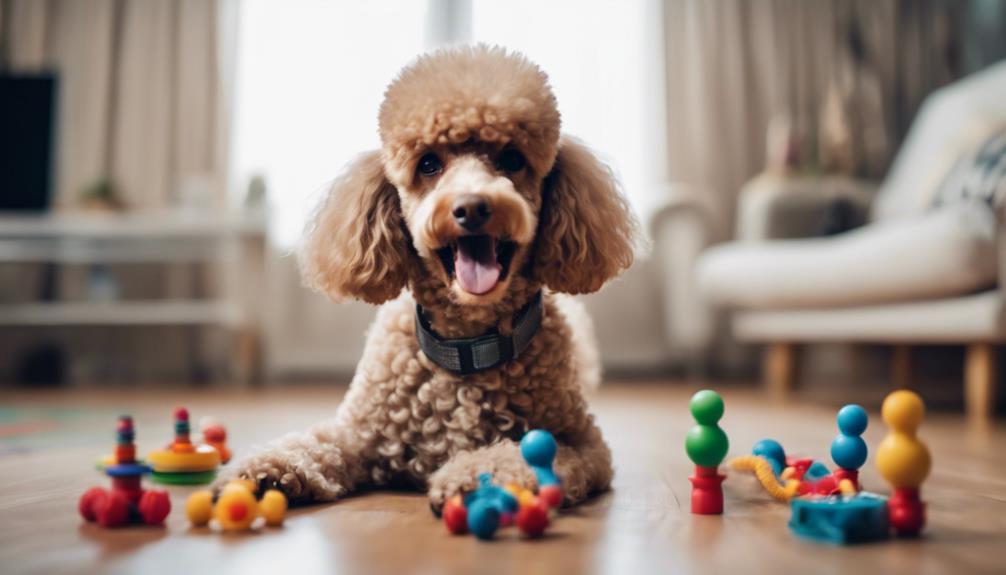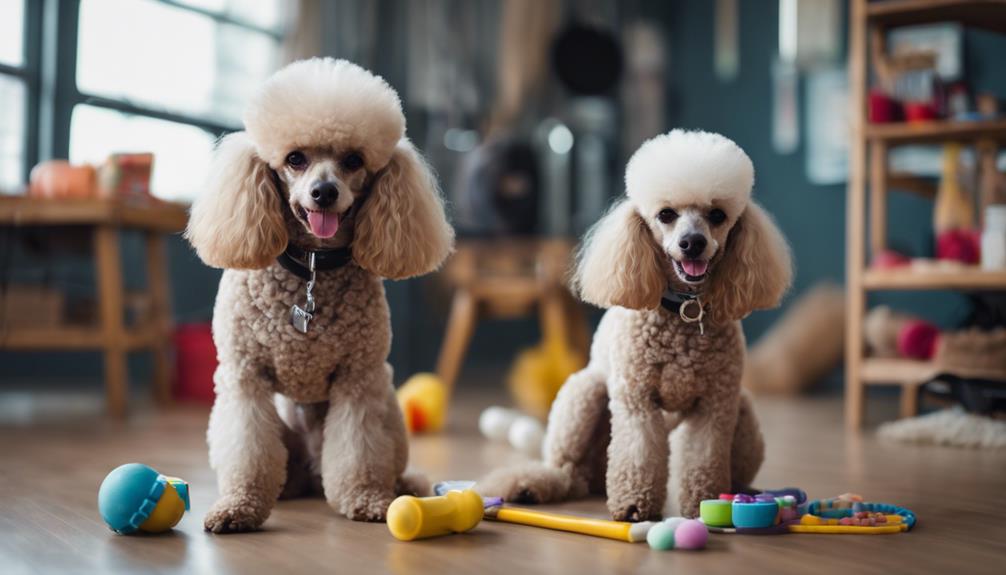When navigating the intricate maze of addressing behavioral health in poodles, you may find yourself at a crossroads where understanding their unique needs is key. Unraveling the complexities of their behaviors can lead to a fulfilling companionship, but how can you decipher the intricate clues they present? Stay tuned to uncover the essential strategies that will guide you through the labyrinth of poodle behavioral health, offering insights that could transform your relationship with these intelligent and sensitive companions.
Key Takeaways
- Early socialization and mental stimulation are vital for preventing behavioral issues in Poodles.
- Consistent routines and positive reinforcement training help manage and prevent common behavioral problems.
- Professional guidance from veterinarians or behaviorists is recommended for effective behavior modification in Poodles.
- Interactive games, exercise, and a structured environment promote good behavior and mental well-being in Poodles.
Common Behavioral Issues in Poodles

If you're a poodle owner, you may have encountered common behavioral issues that stem from their intelligence and energy levels. Poodles, known for their smarts and liveliness, can sometimes exhibit behavior problems such as separation anxiety, resource guarding, and excessive barking. Separation anxiety, a common issue in Poodles, can cause them distress when left alone, leading to behaviors like destructive chewing or incessant barking. Resource guarding, another issue, manifests as the dog protecting their food, toys, or space aggressively. Understanding these behaviors is crucial for effective management.
Poodles, being social creatures, may resort to attention-seeking behaviors like jumping up or digging if they feel lonely or bored. Lack of mental stimulation and physical exercise can exacerbate these problems. Positive reinforcement training techniques are highly recommended to address and prevent behavioral issues in Poodles. By rewarding good behavior and redirecting unwanted actions, you can help your Poodle thrive both mentally and physically.
Signs of Behavioral Distress in Poodles

Poodles may display various indicators of distress through their behavior, including excessive barking, destructive chewing, and sudden aggression.
- Excessive barking: Your Poodle might bark more than usual, which could be a sign of underlying stress or anxiety.
- Destructive chewing: If you notice your Poodle destroying items around the house, it could indicate distress that needs attention.
- Sudden aggression: Uncharacteristic aggression towards people or other pets could be a red flag for behavioral distress in your Poodle.
When your Poodle shows signs of behavioral distress, it's essential to pay attention and address the underlying causes promptly. Behavioral changes like hiding, excessive licking, or loss of appetite can also signal distress in Poodles. Additionally, signs of fear or anxiety, such as trembling, panting, or pacing, should not be ignored. By monitoring your Poodle for stress-related behaviors like tail chasing, excessive drooling, or self-injury, you can help identify and alleviate their distress effectively.
Preventing Behavioral Problems in Poodles

Early socialization and training play a crucial role in preventing behavioral problems in Poodles. Providing mental stimulation through interactive toys and puzzles can help prevent boredom-related behaviors. Regular exercise and playtime are essential to curb destructive behaviors. Positive reinforcement training methods are effective in shaping desirable behaviors. Consistent routines and boundaries contribute to a stable and well-behaved Poodle.
| Preventive Measures | Description |
|---|---|
| Early Socialization | Expose your Poodle to different people, animals, and environments from a young age. |
| Mental Stimulation | Engage your Poodle's mind with interactive toys, puzzles, and training exercises. |
| Regular Exercise | Ensure your Poodle gets enough physical activity to prevent pent-up energy. |
| Positive Reinforcement | Reward good behavior with treats, praise, or playtime to encourage positive habits. |
| Establishing Routines | Create a consistent schedule for feeding, walks, playtime, and training sessions. |
Training Techniques for Poodle Behavior

To effectively shape and reinforce positive behaviors in your Poodle, employing reward-based training techniques is key. Poodles, known for their intelligence and eagerness to please, respond well to positive reinforcement. Here are some insights into training techniques for your Poodle's behavior:
- Clicker Training: Using a clicker to mark desired behaviors and then rewarding your Poodle with treats can help them associate the behavior with a positive outcome.
- Shaping: Breaking down desired behaviors into small achievable steps and rewarding your Poodle for each step towards the final behavior can be highly effective.
- Interactive Games: Incorporating interactive games and puzzles into your Poodle's training routine can provide mental stimulation, keeping them engaged and motivated to learn.
Consistency in training and socialization from an early age are also essential for your Poodle to develop good behavior and manners. By making training sessions fun and rewarding, you can build a strong bond with your Poodle while helping them learn and grow.
Addressing Anxiety in Poodles

If your poodle exhibits signs of anxiety like trembling or excessive barking, it's important to recognize potential triggers causing their distress. Implementing calming techniques, such as creating a safe space or soothing music, can help alleviate your poodle's anxiety. Remember, seeking professional help from a veterinarian or dog behaviorist can provide tailored strategies for effectively managing your poodle's anxiety.
Recognizing Poodle Anxiety Triggers
Recognizing Poodle anxiety triggers involves keen observation of their body language, behavioral patterns, and responses to specific situations. When interacting with your Poodle, pay attention to the following cues:
- Body Language: Watch for signs like tucked tail, ears pulled back, or shaking.
- Behavior Patterns: Notice if your Poodle becomes agitated in certain scenarios or with specific stimuli.
- Responses to Specific Situations: Observe how your Poodle reacts to loud noises, being left alone, or meeting new people.
Understanding these indicators can help you identify what triggers anxiety in your Poodle, enabling you to provide the necessary support and create a calming environment for your furry friend.
Calming Techniques for Poodles
As you focus on addressing anxiety in your Poodle, implementing effective calming techniques is key to promoting their mental well-being and reducing anxious behaviors. Creating a safe and secure environment, establishing a consistent routine, and engaging in regular exercise can help manage your Poodle's anxiety levels. Interactive toys, puzzle feeders, and mental stimulation are great tools to alleviate boredom and reduce stress, contributing to a happier and calmer Poodle. Training your Poodle using positive reinforcement techniques and maintaining consistency in your interactions can boost their confidence and trust, leading to a more balanced demeanor. For tailored strategies and professional guidance in anxiety management, seeking help from a specialized dog trainer or behaviorist can provide valuable insights and support in addressing your Poodle's specific anxiety issues effectively.
Seeking Professional Help
When seeking professional help to address anxiety in your Poodle, consulting a certified dog behaviorist or veterinary behaviorist can provide tailored solutions for their specific needs. These experts can employ behavior modification techniques like desensitization and counterconditioning to help your Poodle with anxiety issues effectively. Additionally, in severe cases, medication prescribed by a veterinary behaviorist may be necessary to manage your Poodle's anxiety. Seeking professional help early on is crucial as it can prevent anxiety from escalating and greatly improve your Poodle's quality of life. Remember, professional trainers and behaviorists can create personalized treatment plans to address anxiety triggers in your Poodle effectively.
Behavioral Modification Strategies for Poodles

How can you effectively utilize positive reinforcement techniques to shape desired behaviors in your poodle? Training your poodle using positive reinforcement is key to fostering good behavior. When your poodle displays the desired behavior, such as sitting calmly or following a command, reward them immediately with treats, praise, or toys. Consistency is crucial in reinforcing positive behaviors. Socialization is equally important for your poodle's behavioral development. Exposing them to various environments, people, and other animals from a young age can help prevent fearfulness or aggression towards unfamiliar stimuli.
Interactive activities like puzzle toys can engage your poodle's mind and prevent boredom-related behaviors such as excessive barking or destructive chewing. If you find it challenging to address specific behavioral issues, seeking guidance from a professional trainer or behaviorist who specializes in poodles can provide tailored solutions. These experts can offer personalized training plans and behavior modification techniques to address your poodle's unique needs. By implementing positive reinforcement, socialization, and engaging activities, you can help your poodle develop into a well-behaved and mentally stimulated companion.
Seeking Professional Help for Poodle Behavior

If your Poodle's behavior is causing concern, seeking professional help is crucial for effective training and behavior modification. A Certified Professional Dog Trainer with Poodle experience can provide tailored guidance, while a veterinary behaviorist offers specialized insights and potential medication options. Ensuring positive reinforcement techniques and expertise in managing Poodle-specific behaviors are key factors to consider when selecting a professional to address your Poodle's behavior.
Expert Poodle Training
Consider consulting a professional poodle trainer to address specific behavior issues your poodle may be exhibiting. Expert poodle trainers can offer tailored solutions for problems such as separation anxiety or excessive barking. When seeking a professional trainer, ensure they have experience working with poodles to understand their unique traits and requirements. Behavior modification techniques, specifically designed for poodles, can effectively tackle behaviors like aggression or fearfulness. Here are some key points to keep in mind when considering expert poodle training:
- Experience Matters: Look for trainers with a proven track record in working with poodles.
- Tailored Techniques: Seek trainers who offer behavior modification programs customized for poodles.
- Enhanced Bond: Working with a professional can strengthen the relationship between you and your poodle while improving their behavior and well-being.
Behavioral Consultation Options
Seek guidance from certified professional dog trainers, applied animal behaviorists, or veterinary behaviorists for tailored behavioral consultations to address specific issues in your Poodle. These experts can create personalized behavior modification strategies to tackle concerns like separation anxiety, aggression, or fearfulness. Through a thorough evaluation of your Poodle's behavior, environment, and triggers, a targeted treatment plan can be developed. Combining various training techniques and, when necessary, medication, these professionals can offer comprehensive solutions to manage your Poodle's behavioral issues effectively. Seeking help from qualified behavior consultants not only enhances your Poodle's well-being but also improves their overall quality of life. Trusting in the expertise of these professionals can lead to positive outcomes for both you and your beloved Poodle.
Professional Behavior Modification
When addressing behavioral concerns in your Poodle, engaging with certified professionals such as dog trainers or veterinary behaviorists is crucial for effective behavior modification. These experts can tailor programs to suit your Poodle's specific needs, ensuring a comprehensive approach to behavioral health. Seek professionals with experience in Poodle behavior to address specific issues effectively.
- Behavior modification programs for Poodles focus on positive reinforcement and tailored training methods.
- Veterinary behaviorists can provide medical interventions and behavior modification plans for complex Poodle behavior problems.
- Choosing the right professional for behavior modification in Poodles ensures a comprehensive approach to address behavioral health issues.
Frequently Asked Questions
How Can I Help My Dog With Behavioral Issues?
To help your dog with behavioral issues, use positive reinforcement for good behavior. Seek professional training for tailored plans. Maintain a consistent routine for stability. These steps will support your dog's well-being and strengthen your bond.
How Do You Address a Bad Behavior in a Dog?
To address bad behavior in a dog, start with positive reinforcement and consistent training techniques. Seek professional guidance for behavior assessment and modification. Remember, patience and commitment are key for long-term positive changes in your furry companion.
What Is the Best Thing a Pet Owner Can Do for Their Dog's Behavioral Health?
To improve your dog's behavioral health, focus on mental stimulation, exercise, positive reinforcement, training, socialization, and creating an enriching environment. These actions can enhance your bond, reduce stress, and promote good behavior in your furry friend.
What Are 5 Abnormal Behaviours of Dogs?
When addressing abnormal behaviors in dogs, observe for excessive barking, digging, chewing, aggression, separation anxiety, pacing, spinning, tail chasing, licking, self-harm, or repetitive actions. Understand these signs through training methods, socialization techniques, and canine psychology.
Conclusion
In conclusion, addressing behavioral health in poodles is essential for their well-being and the harmony of your relationship. Did you know that 20% of poodles exhibit signs of anxiety or fear-based behavior? By seeking professional help, utilizing training techniques, and providing proper mental stimulation, you can help your poodle overcome behavioral issues and live a happier, more balanced life. Remember, patience and consistency are key in fostering a strong bond with your furry friend.
